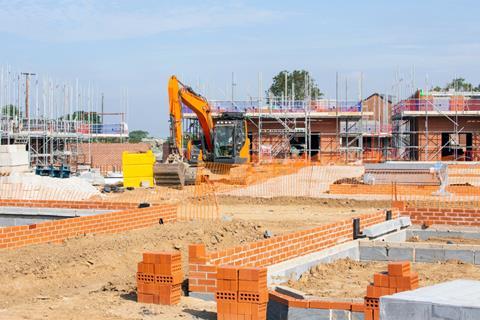Purchasing managers report no growth in November as confidence nosedives to pandemic lows
Housebuilding growth flat-lined in the last month as increasing fears over an imminent recession curtailed construction activity, according to the latest survey data from purchasing managers.
The monthly construction purchasing managers’ index, produced by S&P Global for the Chartered Institute of Purchasing and Supply, found the housebuilding activity index fell back to 50 – which is the “no change” figure, above which any number represents an increase in activity, and below which indicates decline.
This compares to an index figure of 51.2 in October, and is the lowest figure since the summer, when the index recorded two months of declines in activity in June and July.

The housing number came as optimism among construction buyers overall sank to its lowest level for more than two years in the month as worries about future workloads ripped into market confidence.
And fresh data out this morning said the amount of positive sentiment in the industry was at its lowest since December 2008 – when the industry was in the grip of the financial crisis.
The overall index for November remained in positive territory at 50.4, although down sharply from the 53.2 posted in October.
It said market confidence was at its lowest since May 2020 when the country was a few weeks into the first of the lockdowns caused by the covid-19 pandemic.
Commercial work was the only sector to stay in the black last month with a score of 51.1, but civil engineering, which new chancellor Jeremy Hunt said was at the front and centre of the UK’s economic recovery in last month’s autumn statement, continued its slump with a score of 46.7 – the fifth consecutive month of decline. Explaining civils’ ongoing poor performance, Tim Moore, economics director at S&P, said: “A lack of new work to replace completed projects resulted in another fall.”
But Max Jones, a director in Lloyds Bank’s infrastructure and construction team, said he expected civil engineering sentiment to return in the wake of Hunt’s statement. “There are good reasons to be positive about the construction sector, with many firms seeing a big win in the government’s reaffirmed commitment to major public infrastructure projects, such as HS2 and Sizewell C, which are a huge part of the sector’s order books.”
And Brendan Sharkey, head of construction and real estate at accountant MHA, added: “Firms have a steady pipeline of work going into 2023 because many projects were pushed backed this year. For many, last month’s autumn statement occasioned a big sigh of relief as there were no reductions to existing infrastructure spending.” But he admitted: “No one feels very confident about the back end of 2023.”
A silver lining in the S&P data was that inflation eased to its lowest since January 2021 but respondents said transport and logistics delays meant sites were having to wait longer for deliveries.
Meanwhile, construction information firm Glenigan said underlying work of £100m or less starting on site fell 11% from the previous quarter in the three months to November. It said the figure was down 7% on that of a year ago. Civils work was the biggest faller during the period, down a quarter on the previous three months.










No comments yet